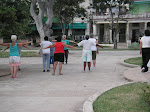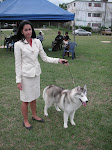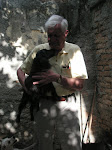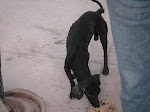Cemetery Musings
Twelve years ago on a trip to Argentina, I learned of the Argentine fascination with death. A visit to the Recoleta Cemetery near my hotel made that preoccupation clear. Recoleta has so many mausoleums, monuments and sculptures that walking through it is something like walking through a museum. When I started to travel to Cuba, I learned this interest in one's ancestors isn't limited to Argentina; it's a Latin American thing.
Havana's huge Cristóbal Colón Cemetery far surpasses Recoleta in size, beauty, history, etc. Its elaborate monuments may be unsurpassed in the world. This is a tale of two gravesites in the Colón Cemetery with a little of what they can teach us.
La Milagrosa
On a hot day in August in the first years of the 20th century, a young Cuban wife, Amelia Goyri, died in childbirth. Her little baby girl did not survive the birth either. Her distraught husband, José Adot buried them with the baby placed between her mother's legs, as was the Spanish custom at the time.
José began visiting the gravesite every day, a routine that lasted 40 years until his death. That's remarkable in itself, but it was hardly the most remarkable facet of this story of love and devotion.
A few years after the loss of Amelia and her baby, José's father died, and the grave was opened to accept his remains. A shocking surprise awaited those who attended the father's burial. They stood in stunned disbelief as they saw the baby was nestled in her mother's arms. To the devout Cuban Catholics, this was a true miracle! Today a beautiful monument of a mother holding her baby in one arm and a large cross in the other stands over the grave, and every day at all hours, young people kneel, pray, and light candles, petitioning God to make their babies healthy.
Jeannette Ryder
Jeannette Ryder was a contemporary of Amelia and José. In 1906 in Havana she founded the Banda de Piedad (the group of compassion) and dedicated herself to helping animals for the rest of her life. Devoting all of her time and treasure to helping animals, Jeannette militated against cruelty to animals and bullfights. (Even then bullfighting was illegal in Cuba.) She has appeared in these blogs before (see posting of 7/30/10).
When Jeanette died in 1931, she was buried in Havana's grand Colón Cemetery. Her faithful dog, Rinty, refused to leave her gravesite, and even returned when forcefully removed from the cemetery. He refused food from the cemetery staff and gradually wasted away and died at his mistress' grave. Today a gorgeous bronze covers the grave replicating Jeannette lying in repose. Curled at her feet is Rinty, whose dedication has caused the site to be called La Tumba de la Lealidad (the tomb of loyalty).
The Parallels
José and Rinty remained faithful to their loves for the rest of their lives. Each came to see his loved one honored with an artistic monument. Both graves, only a few blocks apart in the cemetery, have inspired well-known stories now part of the Cuban culture.
While Amelia's gravesite is known as La Milagrosa (The Miracle) and has become a well-known story to Havana's religious people, it is an icon of familial love. Rinti, inspired by his all-consuming love for Jeannette, did something we rather more expect of dogs than people. He refused to leave even to sustain his own life. Consumate loyalty.
Isn't it odd how we sometimes get more love from our animals than we do even from those closest to us?
Les Inglis
Friday, July 29, 2011
Sunday, July 24, 2011
Bigotes
Bigotes
I suppose one should know a cat's name before one starts to write about her. But I don't. The subject of this little story is a mottled grey female cat who lives at Havana's Presidente Hotel. Lacking her name, I'll call her Bigotes, which means Whiskers in Spanish. Bigotes is the hotel's cat, and she spends most of her time on the wide porches that border the south and east sides of the hotel. She can also be found from time to time in the beautiful pool area on the north side.
The Presidente is 1-1/2 blocks from the Malecon, Havana's coastal highway and alongside Vedado's Avenida de Los Presidentes, arguably the grandest boulevard in Havana. Bigotes lives in a high rent district.
Bigotes looks a lot like Marble, a favorite Calico we had who lived a long and happy life --half of it in one of the barns at our farm. Marble was more colorful than Bigotes (what good is it to be a Calico if she doesn't have lots of color?) But Bigotes is still quite pretty, and, like Marble was, she is well-oriented toward people. The hotel porch and pool areas are filled with tables and chairs, peopled with guests, served by waiters and bar attendants, and patrolled by Bigotes.
I met her on my first trip to Havana six years ago. Missing my own dogs and cats, I would stop to pet her and talk to her whenever I saw her. She liked the attention. On my second stay at the Presidente, I realized she is a long-term, stable resident of the hotel. She's well-fed (probably by some employee of one of the hotel's two very good restaurants), and I could see little bowls of water set around for her. Somebody besides me loves this cat, I thought.
Thus it went through the years, and each time I returned to the Presidente. Bigotes was there for me to enjoy. This year, in March, my traveling companions, Nikki and Mariane, got to know Bigotes as well. They wanted to know if she was spayed and how old she was.. "Yes," George, the younger bellman assured us, "She's 9 years old, spayed and gets good medical attention as needed."
And it couldn't be otherwise, I reasoned. She'd wander away if she didn't have a source of good food, and, if she had not been spayed, a constant procession of litters of kittens would have done her in long ago.
I like the Presidente. Not a slick modern hotel, it was built in 1928. It's economical (about $70 per night compared with $160 for Henry Flagler's masterpiece, Havana's Hotel Nacional.) The Nacional is the twin sister of Palm Beach's The Breakers.
Well, the Presidente isn't as slick as the Nacional, and you won't see many celebrities there, but then the Nacional doesn't have Bigotes for guests to pet.
Les Inglis
I suppose one should know a cat's name before one starts to write about her. But I don't. The subject of this little story is a mottled grey female cat who lives at Havana's Presidente Hotel. Lacking her name, I'll call her Bigotes, which means Whiskers in Spanish. Bigotes is the hotel's cat, and she spends most of her time on the wide porches that border the south and east sides of the hotel. She can also be found from time to time in the beautiful pool area on the north side.
The Presidente is 1-1/2 blocks from the Malecon, Havana's coastal highway and alongside Vedado's Avenida de Los Presidentes, arguably the grandest boulevard in Havana. Bigotes lives in a high rent district.
Bigotes looks a lot like Marble, a favorite Calico we had who lived a long and happy life --half of it in one of the barns at our farm. Marble was more colorful than Bigotes (what good is it to be a Calico if she doesn't have lots of color?) But Bigotes is still quite pretty, and, like Marble was, she is well-oriented toward people. The hotel porch and pool areas are filled with tables and chairs, peopled with guests, served by waiters and bar attendants, and patrolled by Bigotes.
I met her on my first trip to Havana six years ago. Missing my own dogs and cats, I would stop to pet her and talk to her whenever I saw her. She liked the attention. On my second stay at the Presidente, I realized she is a long-term, stable resident of the hotel. She's well-fed (probably by some employee of one of the hotel's two very good restaurants), and I could see little bowls of water set around for her. Somebody besides me loves this cat, I thought.
Thus it went through the years, and each time I returned to the Presidente. Bigotes was there for me to enjoy. This year, in March, my traveling companions, Nikki and Mariane, got to know Bigotes as well. They wanted to know if she was spayed and how old she was.. "Yes," George, the younger bellman assured us, "She's 9 years old, spayed and gets good medical attention as needed."
And it couldn't be otherwise, I reasoned. She'd wander away if she didn't have a source of good food, and, if she had not been spayed, a constant procession of litters of kittens would have done her in long ago.
I like the Presidente. Not a slick modern hotel, it was built in 1928. It's economical (about $70 per night compared with $160 for Henry Flagler's masterpiece, Havana's Hotel Nacional.) The Nacional is the twin sister of Palm Beach's The Breakers.
Well, the Presidente isn't as slick as the Nacional, and you won't see many celebrities there, but then the Nacional doesn't have Bigotes for guests to pet.
Les Inglis
Friday, July 15, 2011
Estafadores
Estafadores
In case the title of this post looks strange to you, it's just the Spanish word for "swindler." Anyone who has traveled outside the US knows you have to be constantly on your guard when you are obviously a tourist. Cuba is the same as most other countries--lots of locals are on the streets to try their cons on the visitors.
As an example of little cons, there's the guy who wants to show you where they make the cigars. He gets a little tip from the cigar factory, and if you buy any, you pay an inflated price. The guy who sat down next to me in the Central Park told me how his little brother is sick and needs milk to get well, but the store that sells milk only takes CUC's, convertible Cuban currency that the locals never have. A peanut vendor sells me a paper cone of nuts and tries to give me worthless old peso coins in change for a 1 CUC coin I gave him.
But recently I learned of bigger cons after bigger money and with far more sinister game plans. If you've read earlier blogs about Cuba the dog and Bella, you know we've devoted some time to rehoming street dogs to families in the north. An expensive and exacting activity, lots of time is needed to work out the details properly.
The usual situation is the tourist sees a street dog begging for food, and falls in love with him or her. That tourist goes home, finds our website, and we get emails asking if there is a way we can find that dog. Perhaps the dog is at a beach resort, a tourist area, or hanging around a hotel. If Aniplant gets involved, we can get veterinary help, a health certificate, and find a way to fly the animal to the US or Canada. Well that's a big job with Aniplant doing the work, but it can be done. We've taken on a number of such projects. Except for the emotional appeal of saving "that little hungry dog I found on vacation," it would be far more efficient to stop by your local shelter and have your choice of breeds, colors, sizes, and ages.
The big swindles can come if the tourist makes that commitment to the dog with only a few days left before he or she must leave and then is forced to rely on strangers to try to keep the dog temporarily, get it vet care, and get it to the airport when you can arrange a ticket to fly it to you. "No problem," the pressed tourist says, "I can pay for any expenses involved" to the helpful stranger near the hotel.
"No problem", says the casual thief, "I am a dog lover, I have a clean place for him to stay, and I know a great vet." The tourist thinks to himself, "someone is up there really looking out for me."
I have no doubt the park swindler with the sick little brother would also immediately offer to give a dog a good temporary home and get him to one of the best vets in town. Like the great retailer, Marshall Field, whose motto was, "give the lady what she wants."
And about how much for a couple of weeks' or a month's fostering, food, vet, etc.? Maybe 300 or 400 CUC's (about 1 CUC per $) will do for now, and the tourist is sure he or she can find a way to send more if there are delays before he is flown to north. The tourist and the thief write down their addresses, phones, even emails, but a week later if you go to that address, the little dog will be gone.
Sue, who didn't initially know about Aniplant, contacted us after returning home, and, at my suggestion, asked Nora to check on the Dachshund dog, Diva, and its "foster home" that she had arranged. The wife of the guy she found in the park gave up the dog to Nora (see picture of the Diva substitute), and Nora emailed its picture to Sue. Guess what? Wrong dog! When they knew a real animal protector was coming, they found a different dog to give to her.
Normally, Nora is very careful to be sure she is receiving the right dog, but the email Sue had sent with pictures went astray, and Nora was flying blind when she got to the house with no idea of what the first dog looked like. But still, the dog needed to be removed from this home--the place wasn't suitable for housing a dog.
Sue, a good soul who had placed many dogs in the past, wants to take both dogs if Diva, the first dog, can be found again. It's bad enough when a dog is abandoned in a strange place by the swindler for easy money, but it can be a death sentence for the dog. At least when street dogs are in familiar environs, they can eke out a living begging for food. Right now we don't know where the first dog is, but we're looking.
In another case, we heard of a traveler who came back to Cuba to get the dog for which she had made casual arrangements with a street person, and found the caretaker demanding a large additional payment--basically a ransom demand.
And even if you aren't swindled and inexperienced people don't handle the dog's paperwork carefully, the dog can be held at the flight destination and possibly even killed by Customs. This could happen even after a successful fostering by a well-meaning friend.
Dogs, cats, cigars, peanut vendors, milk for my little brother--all seem to attract swindlers to scam the tourists' money. Frankly, rehoming a street dog isn't a good idea even when you have qualified help, but how do you tell that to a recent traveler who fell in love with a dog a couple of weeks ago when she was in Cuba?
Les Inglis
In case the title of this post looks strange to you, it's just the Spanish word for "swindler." Anyone who has traveled outside the US knows you have to be constantly on your guard when you are obviously a tourist. Cuba is the same as most other countries--lots of locals are on the streets to try their cons on the visitors.
As an example of little cons, there's the guy who wants to show you where they make the cigars. He gets a little tip from the cigar factory, and if you buy any, you pay an inflated price. The guy who sat down next to me in the Central Park told me how his little brother is sick and needs milk to get well, but the store that sells milk only takes CUC's, convertible Cuban currency that the locals never have. A peanut vendor sells me a paper cone of nuts and tries to give me worthless old peso coins in change for a 1 CUC coin I gave him.
But recently I learned of bigger cons after bigger money and with far more sinister game plans. If you've read earlier blogs about Cuba the dog and Bella, you know we've devoted some time to rehoming street dogs to families in the north. An expensive and exacting activity, lots of time is needed to work out the details properly.
The usual situation is the tourist sees a street dog begging for food, and falls in love with him or her. That tourist goes home, finds our website, and we get emails asking if there is a way we can find that dog. Perhaps the dog is at a beach resort, a tourist area, or hanging around a hotel. If Aniplant gets involved, we can get veterinary help, a health certificate, and find a way to fly the animal to the US or Canada. Well that's a big job with Aniplant doing the work, but it can be done. We've taken on a number of such projects. Except for the emotional appeal of saving "that little hungry dog I found on vacation," it would be far more efficient to stop by your local shelter and have your choice of breeds, colors, sizes, and ages.
The big swindles can come if the tourist makes that commitment to the dog with only a few days left before he or she must leave and then is forced to rely on strangers to try to keep the dog temporarily, get it vet care, and get it to the airport when you can arrange a ticket to fly it to you. "No problem," the pressed tourist says, "I can pay for any expenses involved" to the helpful stranger near the hotel.
"No problem", says the casual thief, "I am a dog lover, I have a clean place for him to stay, and I know a great vet." The tourist thinks to himself, "someone is up there really looking out for me."
I have no doubt the park swindler with the sick little brother would also immediately offer to give a dog a good temporary home and get him to one of the best vets in town. Like the great retailer, Marshall Field, whose motto was, "give the lady what she wants."
And about how much for a couple of weeks' or a month's fostering, food, vet, etc.? Maybe 300 or 400 CUC's (about 1 CUC per $) will do for now, and the tourist is sure he or she can find a way to send more if there are delays before he is flown to north. The tourist and the thief write down their addresses, phones, even emails, but a week later if you go to that address, the little dog will be gone.
Sue, who didn't initially know about Aniplant, contacted us after returning home, and, at my suggestion, asked Nora to check on the Dachshund dog, Diva, and its "foster home" that she had arranged. The wife of the guy she found in the park gave up the dog to Nora (see picture of the Diva substitute), and Nora emailed its picture to Sue. Guess what? Wrong dog! When they knew a real animal protector was coming, they found a different dog to give to her.
Normally, Nora is very careful to be sure she is receiving the right dog, but the email Sue had sent with pictures went astray, and Nora was flying blind when she got to the house with no idea of what the first dog looked like. But still, the dog needed to be removed from this home--the place wasn't suitable for housing a dog.
Sue, a good soul who had placed many dogs in the past, wants to take both dogs if Diva, the first dog, can be found again. It's bad enough when a dog is abandoned in a strange place by the swindler for easy money, but it can be a death sentence for the dog. At least when street dogs are in familiar environs, they can eke out a living begging for food. Right now we don't know where the first dog is, but we're looking.
In another case, we heard of a traveler who came back to Cuba to get the dog for which she had made casual arrangements with a street person, and found the caretaker demanding a large additional payment--basically a ransom demand.
And even if you aren't swindled and inexperienced people don't handle the dog's paperwork carefully, the dog can be held at the flight destination and possibly even killed by Customs. This could happen even after a successful fostering by a well-meaning friend.
Dogs, cats, cigars, peanut vendors, milk for my little brother--all seem to attract swindlers to scam the tourists' money. Frankly, rehoming a street dog isn't a good idea even when you have qualified help, but how do you tell that to a recent traveler who fell in love with a dog a couple of weeks ago when she was in Cuba?
Les Inglis
Saturday, July 2, 2011
Imagine
Imagine
Imagine you wake to find yourself on the streets of a large city, hungry and scared. You don't seem to have any connections there, and you don't have any idea of where you fit in. There seem to be two kinds of people on the streets and they don't all talk alike. But some, the minority, seem to have more than enough to eat, and they often throw away leftovers. If you're lucky enough to be around when they throw food away, that's what you eat. If not, your old companion, hunge,r always hovers nearby.
Your leg hurts from a run in with a car, and you limp a little. You wonder if it will ever be much better, but at least you did learn to cross the street when people do to avoid other mishaps with cars.
You've learned there are a few people on the streets who like you--even pet you and feed you scraps. You've learned these are usually same the people who look well fed, and you learn to hang out in the part of town where the kinder people congregate. You like them, but they usually walk away. Your beat is hotels, restaurants and tourist attractions.
You can't remember a family or a real home. You remember a little of your mom, and you haven't seen her in a long time. Your memory is more of her smell and feel than what she really looked like. But that's all in the past now--you really don't expect to see her ever again, and that cute little bunch of brothers and sisters you were with were picked up by men in a truck never to be seen again. You wonder if you were lucky the men missed you that day. When there is little food, you're not so sure you were lucky to have been overlooked.
One day a well fed find man paid far more attention to you than you expected, and your life began to change. That man was a tourist, but he picked you up, gave you food and a temporary home and even a bath and lots of medical care. They made your leg stop hurting. You had changed from street dog to companion animal. You learned you had a name, Fidelity, and your temporary caretakers trained you to a cage and a leash. But after several days you wondered where was the kind man who changed your life?
One day a lady picked you up in a car and drove 2 hours to an airport. There they all seemed to make a fuss over you as papers, tickets, and health certificates were bandied about. Finally, stowed in a travel carrier and accompanied by lots of baggage, you are placed in a pressurized, air-conditioned baggage compartment for a 6 hour long, dark and noisy transfer to Toronto Canada.
You felt a spark of recognition as the kind man met the plane around midnight. Others gathered around including reporters flashing their cameras, and suddenly that strange, far away, inhospitable city became a distant memory.
You had one more long flight from Toronto the New Orleans to reach your new forever home with the kind man where you'll never lack for food or medical care or love and companionship again.
Imagine if all street dogs had a good home.
Les Inglis
PS Fidelity arrives at his new home on the same day as this posting.
Imagine you wake to find yourself on the streets of a large city, hungry and scared. You don't seem to have any connections there, and you don't have any idea of where you fit in. There seem to be two kinds of people on the streets and they don't all talk alike. But some, the minority, seem to have more than enough to eat, and they often throw away leftovers. If you're lucky enough to be around when they throw food away, that's what you eat. If not, your old companion, hunge,r always hovers nearby.
Your leg hurts from a run in with a car, and you limp a little. You wonder if it will ever be much better, but at least you did learn to cross the street when people do to avoid other mishaps with cars.
You've learned there are a few people on the streets who like you--even pet you and feed you scraps. You've learned these are usually same the people who look well fed, and you learn to hang out in the part of town where the kinder people congregate. You like them, but they usually walk away. Your beat is hotels, restaurants and tourist attractions.
You can't remember a family or a real home. You remember a little of your mom, and you haven't seen her in a long time. Your memory is more of her smell and feel than what she really looked like. But that's all in the past now--you really don't expect to see her ever again, and that cute little bunch of brothers and sisters you were with were picked up by men in a truck never to be seen again. You wonder if you were lucky the men missed you that day. When there is little food, you're not so sure you were lucky to have been overlooked.
One day a well fed find man paid far more attention to you than you expected, and your life began to change. That man was a tourist, but he picked you up, gave you food and a temporary home and even a bath and lots of medical care. They made your leg stop hurting. You had changed from street dog to companion animal. You learned you had a name, Fidelity, and your temporary caretakers trained you to a cage and a leash. But after several days you wondered where was the kind man who changed your life?
One day a lady picked you up in a car and drove 2 hours to an airport. There they all seemed to make a fuss over you as papers, tickets, and health certificates were bandied about. Finally, stowed in a travel carrier and accompanied by lots of baggage, you are placed in a pressurized, air-conditioned baggage compartment for a 6 hour long, dark and noisy transfer to Toronto Canada.
You felt a spark of recognition as the kind man met the plane around midnight. Others gathered around including reporters flashing their cameras, and suddenly that strange, far away, inhospitable city became a distant memory.
You had one more long flight from Toronto the New Orleans to reach your new forever home with the kind man where you'll never lack for food or medical care or love and companionship again.
Imagine if all street dogs had a good home.
Les Inglis
PS Fidelity arrives at his new home on the same day as this posting.
Subscribe to:
Posts (Atom)





























































































